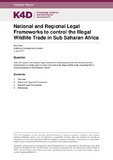| dc.contributor.author | Price, Roz | |
| dc.coverage.spatial | Sub-Saharan Africa | en |
| dc.date.accessioned | 2019-01-07T13:53:36Z | |
| dc.date.available | 2019-01-07T13:53:36Z | |
| dc.date.issued | 2017-07-04 | |
| dc.identifier.citation | Price, R.A. (2017). National and Regional Legal Frameworks to control the Illegal Wildlife Trade in Sub Saharan Africa. K4D Helpdesk Report. Brighton, UK: Institute of Development Studies | en |
| dc.identifier.uri | https://opendocs.ids.ac.uk/opendocs/handle/20.500.12413/14237 | |
| dc.description.abstract | Although Sub Saharan countries may have signed up to Multi-lateral Environment Agreements and regional frameworks and these are theoretically part of the country’s law, their importance is rarely considered at the national level. Therefore, there exists a large disconnect between international, regional and local legal regimes. A consistent theme in the reviews is that significant work needs to be done in each country in order to effectively tackle the illegal wildlife trade (IWT), and weaknesses exist in the principal legislation. These include loopholes, variations on provincial implementation of national laws, inadequate penalties, and in some cases, extremely antiquated legislation or legislation which is contrary to the country's obligations under CITES. Substantial differences exist across Sub Saharan African countries in terms of the severity of penalties for violating local wildlife law. Countries with particularly stringent fines and/or lengthy jail sentences of four years or more for a wide variety of wildlife offences include South Africa, Zimbabwe, Namibia and Zambia. One of the key findings is the response from Sub Saharan African countries to the IWT crisis has largely been uncoordinated with each individual country preferring to tackle the issue in-country rather than cooperating as a network of states that face a common problem. Furthermore, there is great variation in offences and penalties used by Sub Saharan African countries. Legislation needs to include mandatory minimum penalties for poaching, as this removes the discretion of the courts to give light penalties. | en |
| dc.language.iso | en | en |
| dc.publisher | IDS | en |
| dc.relation.ispartofseries | K4D Helpdesk Report;147 | |
| dc.rights.uri | https://www.nationalarchives.gov.uk/doc/open-government-licence/version/3/ | en |
| dc.subject | Development Policy | en |
| dc.subject | Governance | en |
| dc.subject | Trade | en |
| dc.title | National and Regional Legal Frameworks to control the Illegal Wildlife Trade in Sub Saharan Africa | en |
| dc.type | Other | en |
| dc.rights.holder | © DFID - Crown copyright 2017. | en |
| dcterms.dateAccepted | 2017-07-04 | |
| rioxxterms.funder | Department for International Development, UK Government | en |
| rioxxterms.identifier.project | K4D | en |
| rioxxterms.version | VoR | en |
| rioxxterms.funder.project | 238a9fa4-fe4a-4380-996b-995f33607ba0 | en |

